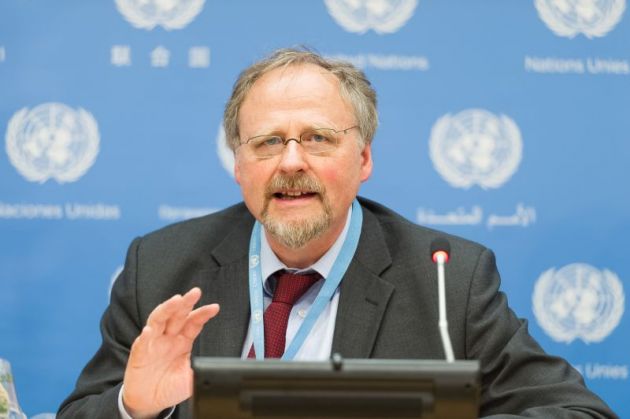UN freedom of religion expert urges Yemen to halt 'systematic harassment' of Bahá'í

GENEVA – It is not only Christians who face persecution in some countries in the Middle East, as human rights organizations have said recently at the United Nations.
The United Nations Special Rapporteur on freedom of religion or belief, Heiner Bielefeldt, has called on the authorities in Yemen to put an end to the systematic harassment of the Bahá'í population in the country.
Bielefeldt said Oct. 4 the harassment includes arbitrary arrests and detentions and he called for the release of three leaders of the Bahá'í Yemeni community detained over two months ago.
"No one should be persecuted based on their religion or belief and neither should they be targeted when belonging to religious minorities," the human rights expert said.
"Random arrests, detentions, raids of their homes and offices as well as confiscation of electronic devices and significant sum of money are simply unacceptable."
Of Yemen's population of some 27 million just over 99 percent are Muslims of whom it is estimated that 65 percent are Sunni and 35 percent are Shia.
"The Yemeni authorities should also immediately release all detained Bahá'ís who seem to be targeted based on their religion," said Bielefeldt.
He recalled the cases of Nadim Tawfiq Al-Sakkaf, Nader Tawfiq Al-Sakkaf and Kaiwan Mohamed Ali Qadri, imprisoned since Aug. 10.
The three Bahá'í leaders were detained following a mass arrest of 60 Bahá'ís and non-Bahá'ís across the country at a nine-day event of moral and educational youth programmes in Jud Organization building in Sana'a.
Most of the arrested people were subsequently released but them.
"Any arrest or detention based on the exercise of the freedom of religion is arbitrary," the Special Rapporteur underscored. "It is worrying to learn that these arrests were allegedly instructed by the prosecutor in the country."
'UNLOCK THE BAHÁ'Í CENTER'
"The authorities must also unlock the Bahá'í center and allow the Bahá'ís to access it," he said. "Persons belonging to religious minorities, including members of the Bahá'ís, must be ensured their rights to freedom of religion and belief."
The human rights expert also drew attention to the case of Hamid Kamali Bin Haydara arrested in 2013, who remains incarcerated in the National Security Prison for "compromising the independence of the Republic of Yemen."
That offense includes spreading the Bahá'í faith in the Republic of Yemen. His trial has been postponed on numerous occasions up till September 2016.
"I remain concerned that the due process for Mr. Kamali's case has fallen below the fair trial standards as guaranteed by international human rights law," said Bielefeldt while stressing that Kamali is suffering from serious health conditions that require proper medical attention
The Special Rapporteur reminded the Yemeni authorities that they must uphold their international obligations and do all they can to protect all citizens in the country under any circumstances.
Bielefeldt's call has been endorsed by the UN Special Rapporteur on minority issues, Rita Izsák-Ndiaye and the UN Working Group on Arbitrary Detention.
The Bahá'í Faith is a monotheistic religion which emphasizes the spiritual unity of all humanity and it began in 19th century Persia.
